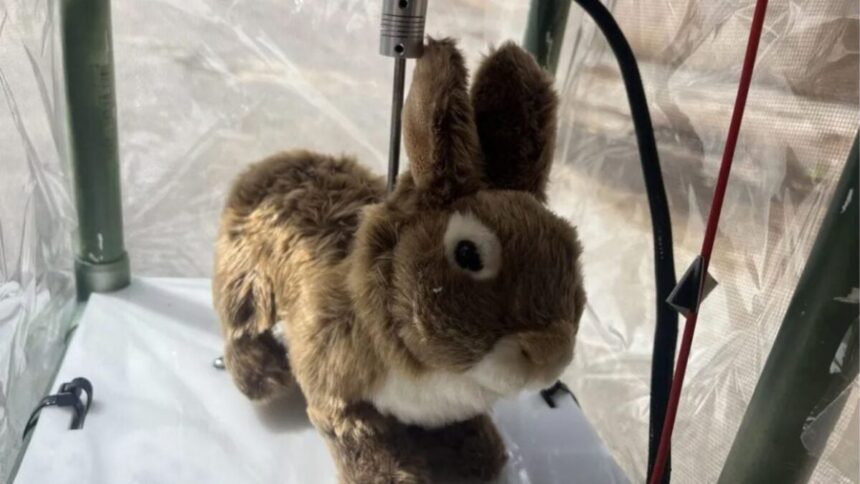Invasive Burmese pythons are a scourge upon South Florida. These massive snakes are one of the region’s most pernicious pests, posing a significant risk to local biodiversity as they chow down on native wildlife.
Burmese pythons were introduced to Florida through the exotic pet trade in the 1970s and are now among the state’s top predators. Researchers and conservationists have been working to wrangle the python problem through capture and kill programs but have faced significant challenges. These elusive snakes are masters of camouflage that thrive in semi-aquatic, densely vegetated environments like the Everglades, making it difficult to find them. Now, a team of wildlife ecologists at the University of Florida has developed a new method for luring them out of their hiding places: robo-bunnies.
Yes, you read that right. According to a UF statement, assistant professor and ecologist Chris Dutton ripped the stuffing out of 40 plush bunny toys and filled them with motors, heaters, and solar panels to make them mimic real marsh rabbit prey. The robo-bunnies are designed to trick pythons into thinking they’re the real deal—or should we say, the real meal. They look like rabbits, move like rabbits, and even exhibit a living rabbit’s body temperature.
“We want to capture all of the processes that an actual rabbit would give off,” said Dutton’s colleague Robert McCleery, a UF professor of wildlife ecology and conservation who is leading the project, according to The Palm Beach Post.
Previous studies showed that live rabbits placed in pens attract about one python per week on average, but it requires too much work to care for multiple rabbit pens spread out across the Everglades, The Palm Beach Post reported. Robo-bunnies require far less maintenance, offering a much less labor-intensive way to lure pythons into the open.
Dutton and McCleery began testing their solar-powered, remote-controlled rabbits this month, placing them in pens in various parts of South Florida. Each robo-bunny is equipped with a motion-sensor camera that alerts researchers when a python approaches.
If proven effective, this method could make it much easier for wildlife experts to capture these snakes. In recent years, Florida has taken aggressive steps to reduce the python population in the Everglades, including incentivized removal efforts such as the 2024 Florida Python Challenge. During this competition, more than 850 participants eliminated nearly 200 destructive pythons from public lands in South Florida. The grand prize winner, Ronald Kiger, removed 20 pythons and won $10,000.
“Every python that is removed and eliminated is making a difference to protect the Everglades and South Florida’s diverse and native wildlife,” the South Florida Water Management District states. These invasive predators pose a significant threat to the Everglades ecosystem, reducing prey that panthers, raptors, bobcats, and other native predators rely on as primary food sources, the district adds.
Dutton and McCleery’s clever new lure may eventually help reduce the Burmese python’s ecological impact, but first, they need data to show that it works. McCleery told Gizmodo that he expects to have that data by November. If the robo-bunnies’ lifelike motion and body heat can’t fool the snakes, the researchers plan to add rabbit scent to make them even more convincing, according to The Palm Beach Post.
Read the full article here












